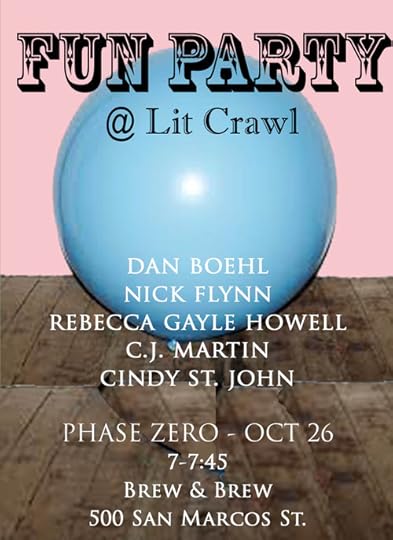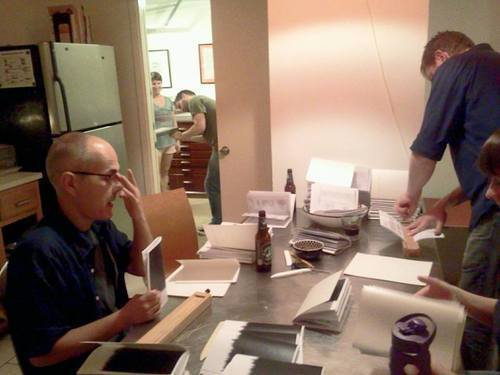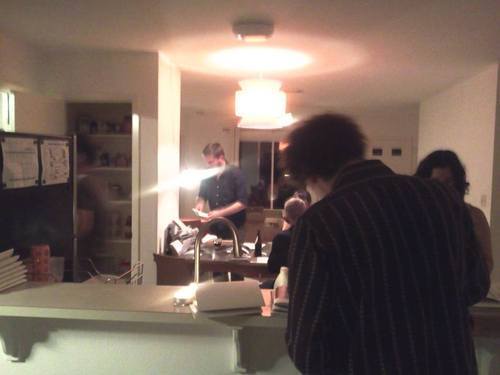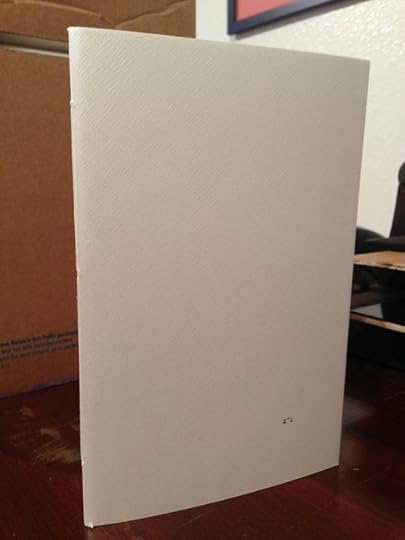C.J. Martin's Blog, page 48
October 16, 2013
opened by customs: 10-16-13
kept throwing the word work at the ruins of work . part
what you can’t climb . the music . meant to destroy the condition of the lonely child one’s eyes become in absorbing the contact points with the hollywood film . called life-script kid . you’re in where you skin ends and underneath that ….
October 15, 2013
October 14, 2013
Important! Please sign and Share: Poetry Foundation/ Poets in Need...
Tumblr friends: please help us:
We want to get 1,000 signatures and send the letter to the Poetry Foundation….
http://www.change.org/petitions/the-poetry-foundation-make-a-strong-financial-commitment-to-aid-poets-in-need?share_id=jSEICZrZMx&utm_campaign=friend_inviter_chat&utm_medium=facebook&utm_source=share_petition&utm_term=permissions_dialog_true
October 12, 2013
gestaltdandle:
-PAUL KLINGER, from RUBBLE PAPER, PAPER RUBBLE...
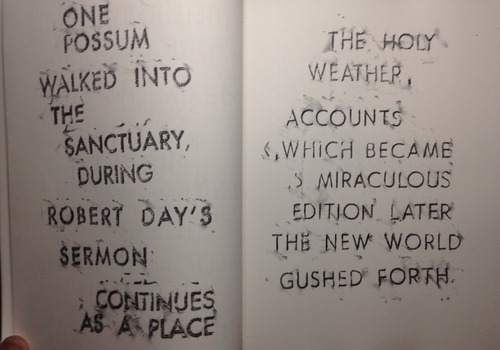
-PAUL KLINGER, from RUBBLE PAPER, PAPER RUBBLE (Further Other Book Works 2013)
Last week I got to hear chapters of this, voiced with the phonetic settling of steel beams set gently into a squat frame to drape all Texas over. Tho Klinger’s reading was dutiful to the work and serious and amiable in just the right proportions, the poems aloud can’t capture the texture of the page. Their lyric loft drifts off. They need the page’s ground to compel their rise from it. And these mapped words may be Braille’s origin myth—to experience them as sound or sight alone gives rise to a basic lack. But w/in the smudged noise the rubbings are worn thru, the senses converge, and the sensate’s dulled in its heightening, and there you are where Klinger began, finding worn lyric within monument not by the common anemia of erasure but by the first art act, making marks.
October 11, 2013
If you’re in Austin, Malvern Books is worth checking out: mostly...

If you’re in Austin, Malvern Books is worth checking out: mostly poetry from small presses. This was today’s find.
October 8, 2013
The Ordinary Weather (Part IV)
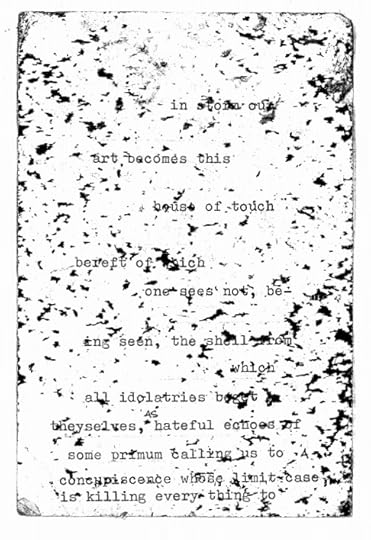
I’ll be periodically posting pieces of the following. If you haven’t picked up a copy of David Brazil’s The Ordinary, it’s available here.
- - -
10-3
“Shall we be found hanging in the trees next spring?” - - - Wallace Stevens, “Auroras of Autumn”
Stevens’ question from “Auroras of Autumn”—which, I told my brother as we walked down the aisle to the viewing at the first funeral, is a poem about the indifference of weather—seems like some strange cousin to David’s question in “Economy” about “doing the right things with my time.” There’s an ambivalence in David’s poem (back of exuberance, back of activism) as to what possible outcome can be expected from a work of poetry, and I think it’s this ambivalence that ultimately justifies the project of defining or interrogating ECONOMY in precisely a book of poems instead of or prior to, say, Oscar Grant Plaza. David’s poem precedes, chronologically, much of Occupy. It opens onto Occupy, is perhaps a first report, in poetry, of the milieu or nascence of that movement(s).
What I mean is: it’s precisely in poem-work, with all its thrown wrenches—where “art becomes this house of touch” NOT RHETORIC & NOT YET DIRECT ACTION—precisely here that the question of economy can be hazarded without recourse to consensus-toward-movement—& where the question of will it have mattered (or will we be strung up anyway) can nonetheless land with the force of an inexorable momentum (of fucking proceeding regardless). I remember David’s poem as calling back to the Arab Spring & I think of it, now, alongside poems like Herman Melville’s “The Portent”—a kind of herald.
10-4
Meaning, it isn’t really a question of whether to be doing these poems, now, or if it is, it’s a late question & speaks to its own too-lateness as much as anything else:

In William Carlos Williams’ 1939 essay, “Against the Weather: A Study of the Artist”—where he offers a sometimes useful but more often aggravating set of claims about art’s historical immanence, its permanence—he lights out from a series of questions that would seem to have some proximity to David’s concerns (but don’t):

Williams’ individualistic hero-artist (to sum up) stages a resistance to weather (read ‘history’) by adopting formal strategies that circumvent the prevailing winds, so to ‘survive.’ But in David’s formulation, “right things” are done “with my time” (emphasis mine). Representation in “Economy” isn’t a question that can be safely situated as belonging to poetics or to art (Is The Artist doing the right things in relation to historical time?), and it isn’t strictly a formal question (Am I doing the right things with my line?)—it’s a question of DOING-WITH (i.e. in concert).
So, not poems against the weather, but (like everything else) subject to it. Not poets charged with representation, but people, gulping after it, in commons.
- - -
How the WCW model fucks me:
In a dream last week, I walked out onto the screened-in back porch of my grandmother’s house (one of the last things my mother remembers from when the tornado hit is that “the porch came inside”). My grandfather sat looking out in the direction of where the house landed, but in the dream everything was intact. I approached and put my hand on his shoulder (sense memory in the dream of touching his sturdy frame & feeling the bones of his shoulders etc.—in life). We were laughing in the dream, and when he said to me, “YOU COULD HAVE CHANGED EVERYTHING,” we laughed even harder. My brother might have been there.
On waking, this dream renewed the profoundest sadness in me, even though I know—or tell myself I know—that the dream’s thinking, or my waking thought, is toxic.
- - -
What happens when thought about representation undergoes a sea change:
My mother’s recovery was crowd-sourced, as were the funerals. Because she had no medical insurance, we knew that we couldn’t afford either, so when a friend of my mother’s set up a donation account at a local bank & a friend of Julia’s set one up online, I sent word to everyone in my address book. In addition to people who already knew my family, so many poets sent money, & family and friends of those poets pitched in, too. A benefit chapbook was compiled, but by the time it had been edited and assembled, my mother had received so much support that she requested the funds be donated (in my father’s name) to Poets in Need. & I’m now convinced, and filled with gratitude, that there are communities of poets DOING-WITH their time, not absenting themselves from it.
10-5
Cf. Williams’ story of George Washington’s going into the woods of open formation & Brazil’s home economics of “the junked house” (or the house disintegrating):

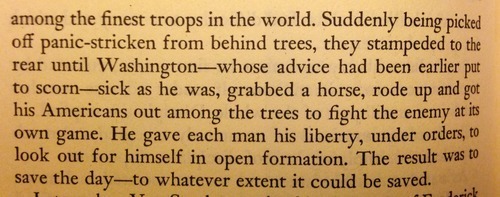
In WCW’s parable about Washington, which quickly charges onward to talk of Whitman’s poetic form, he opts for open form as a strategy that does little more than reify the war effort (on the heels, we might add, of a double theft—of land, of strategy). Washington goes into the woods to take the woods. In WCW’s bleak but misleading formulation: “Disperse and survive.”
By 2011, we have as our inheritance that we find ourselves suddenly in the thick of a socio-economic wilderness, and so these movements that put on homelessness as a critical countenance, that squat in homes to defend domestic life from abstract accumulations of wealth, and that block harbors to retune the very project of “home management.” The house is “junked” because uncovered to be “the ‘hidden abode of production’”:
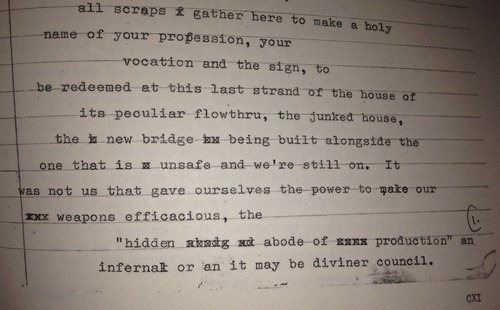
For me, David’s question isn’t about which woods is ours, but rather, how go into a woods w/o possessing it. I understand “Economy” as an effort to work out survival against not an enemy but the very conflict that pits one person (the person) against systems (personified).
- - -
Read Part I of this piece here.
Read Part II of this piece here.
October 3, 2013
supersuperette:
new work by CJ Martin : 2012
CJ...

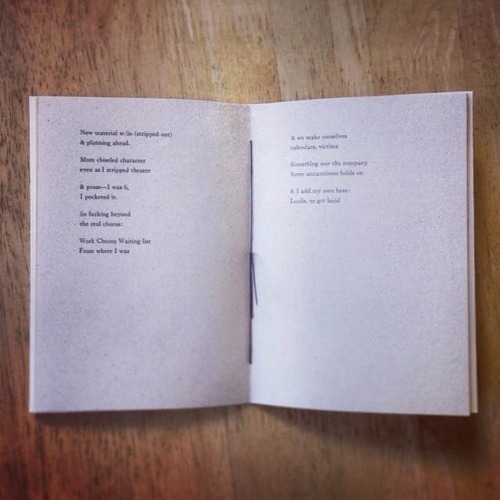

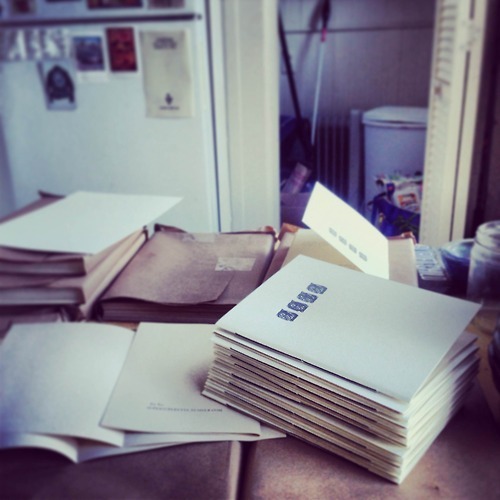





new work by CJ Martin : 2012
CJ Martin : 2012 : CJ Martin : 2012 : CJ Martin : 2012
CJ Martin : 2012 : CJ Martin : 2012 : CJ Martin : 2012
CJ Martin : 2012 : CJ Martin : 2012 : CJ Martin : 2012
[[ fresh off the press : SUPERSUPERETTE’s debut, totally-letterpressed publication : fourteen untitled poems by CJ Martin, who’s full-length, Two Books, was recently released by Compline : and this chapbook contains : fourteen day-full pages of “popular songs / massive shock, true colors” : “calendars, victims” : and more ]]
CLICK HERE : CLICK HERE : CLICK HERE : CLICK HERE
(to purchase via paypal and support future publications)
CLICK HERE : CLICK HERE : CLICK HERE : CLICK HERE
(prices are negotiable down to zero dollars : message me)
supersuperette would like to send a huge thanks to Michael Cross @ Compline for basically everything you see
if you haven’t yet checked out CJ’s ongoing project, one poem in a day once a month : take a look
September 29, 2013
Rhyme eats the words: 9/29 at Unnameable Books: Klinger - Martin - Dreiblatt - Plant
:

Reading at Unnameable Books
Sunday, September 29th, 7:30 pm
600 Vanderbilt Ave, Brooklyn, NY 11238
(718) 789-1534
Join us!
Ian Dreiblatt is a poet & the translator of, most recently, Nikolai Leskov’s The Enchanted Wanderer. Work has…
TONIGHT!! & THERE WILL BE COPIES OF PAUL’S BOOK, THE BENEFIT CHAPBOOK, AND A COUPLE OF NEW CHAPBOOKS OF MINE FOR SALE.
September 24, 2013
COMPLINE: Pre-order Z"L: A Benefit Chapbook for CJ Martin and Julia Drescher
Our friends in Texas have been busy folding and binding Z”L, a benefit chapbook for poets CJ Martin and Julia Drescher, and I’m happy to say the book is finally ready for pre-order. Edited and executed by Ash Smith with letterpress cover and flyleaf by…
C.J. Martin's Blog
- C.J. Martin's profile
- 11 followers


